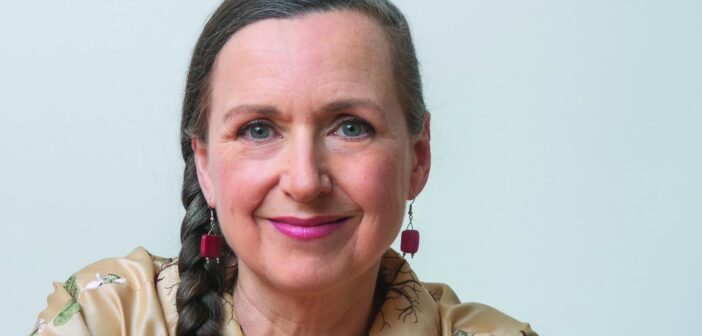
This page is also available in / Cette page est également disponible en:
![]() Francais (French)
Francais (French)
Surrounded by her books, her harpsichord, and furniture dating back to New France, the founder of Les Idées heureuses and specialist of the works of Christoph Graupner, Geneviève Soly, reviews her musical career.
People of the soil, music in their hearts
“I come from a farming family,” she says. “My ancestors were profoundly musical people and like many country families in Quebec, everyone sang.” Growing up with her twin sister Isolde and brother Éric, her family wasn’t typical of the 1950s and ’60s. Their father, Bernard Lagacé, taught the organ at the Conservatoire de musique de Montréal (CMM) and their mother, Mireille Béguin, taught the harpsichord at the New England Conservatory in Boston, and later at the CMM as well.
Following her heart, the young Soly studied literature at Cégep du Vieux Montréal, German at the Goethe Institute, and took classes in organ, harpsichord and violin at the CMM. She earned first prize in organ in 1976 and graduated from the CMM with a prize in harpsichord in 1977. She later studied with Anton Heiller in the Netherlands. At just 17, she won third prize at the Innsbruck international organ competition.
The 1970s and the resurgence of Baroque music in Quebec
Soly remembers a time of great freedom in Quebec. “It was the 1970s, the Quiet Revolution, and we felt anything was possible. It was truly exhilarating.” She sang at the Studio de musique ancienne de Montréal (SMAM) and played chamber music with her colleagues at the Conservatoire. Her generation’s approach to the repertoire differed widely from the guidelines of the conservatory at the time. “We were rebels, we were hippies—we didn’t care about convention. Our lives were devoted to rehearsing, discovering and singing early music.”
After receiving a grant from the Canada Council for the Arts, she moved to Paris in 1978 to study early music in depth. She spent two and a half years travelling in Europe, and met her mentor, Luigi Ferdinando Tagliavini. When she returned to Quebec, she discovered the hard reality of a career as solo harpsichord player and barely made ends meet for two years. Finally, she found stability with jobs at Collège Marie de France and I Musici de Montréal. Around the same time, she began building her own career under her new name: Geneviève Lagacé became Geneviève Soly.
In 1987, Soly founded Les Idées heureuses with the intention of exploring Baroque music using historic criteria while providing good working conditions for musicians. The idea caught on: she was joined by people who shared her vision and helped her obtain grants.
During her 36 years at the helm of Les Idées heureuses, Soly gave more than 175 concerts in Montreal, toured widely in Europe and the U.S., had concerts aired on radio on both sides of the Atlantic, and won prizes internationally for her recordings. The ensemble was also recognized for its contribution to the renewal of Baroque dance in Quebec, including several tours of the show Musique et danse en Nouvelle-France, as well as its partnership with the French troupe L’Éventail during the festival Montréal en Lumière in 2001.
Discovering Graupner
In 2000, a grant from the Conseil des arts et des lettres du Québec allowed her to explore the harpsichord archives at Yale. There, she found a volume of the Partitas for Harpsichord by Christoph Graupner (1683-1760), a German composer time had forgotten. Soly now devoted much of her career to re-establishing his work.
She gave lecture recitals on Graupner across Canada, the United States, Switzerland and France; lectures, notably at the Sorbonne on the occasion of the 250th anniversary of the composer’s death, and on the radio; produced a dozen or so records devoted to the works of Graupner on the Analekta label, seven on the harpsichord and four with the Ensemble; and worked on an edition of the Partitas for Harpsichord published later by Breitkopf und Härtel. In 2010, she signed the City of Montreal’s Livre d’or at an honorary ceremony marking her outstanding work on the German composer. Today, the name Soly is closely intertwined with that of Graupner.
New France and the women who built it
For Soly, the builders of French-Canadian society were women like Marie de l’Incarnation, Catherine de Saint-Augustin, Jeanne Mance and Marguerite Bourgeoys. “It’s extraordinary, what those women achieved. I don’t think we’d be here now if it hadn’t been for Jeanne Mance and Marguerite Bourgeoys,” she says.
Geneviève Soly has stood up for women, especially within Les Idées heureuses. It was no accident that she handed over the reins of the ensemble to harpsichord player, actress and singer Dorothéa Ventura, whom she knows from her teaching career at Collège Marie de France. “Dorothéa has always been like a younger sister,” she says.
Many students benefited from her support, for Soly is a dedicated teacher. “Many people say that I am generous, but giving your knowledge and time, sharing your love for something — you receive a lot more in return than the simple act of giving. For me, it’s completely natural ; it goes together and it’s very nourishing.”
Translation: Cecilia Grayson
This page is also available in / Cette page est également disponible en:
![]() Francais (French)
Francais (French)















